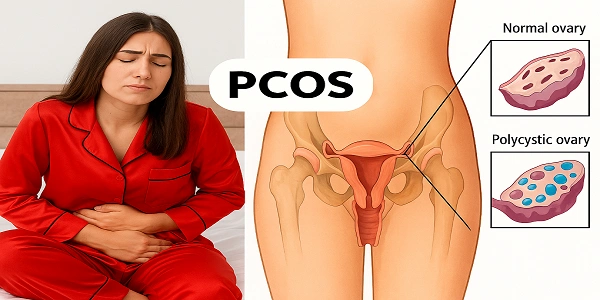In today’s busy life, women’s health has become a serious issue. Many diseases related to hormonal imbalance are coming to the fore, the most common and rapidly growing problem of which is PCOS, i.e., polycystic ovary syndrome.
Nowadays, 1 out of every 5 women is being affected by this disease. It not only affects hormones but also has a profound effect on fertility, weight, skin, and mental health.
Today, through this article, we will know what Polycystic Ovary Syndrome is. And will understand in depth about its causes, symptoms, tests, treatment, and home remedies.
What is Polycystic Ovary Syndrome?
Polycystic Ovary Syndrome is a hormonal disorder in which small cysts (lumps) are formed in the ovaries of women. Due to this, the eggs in the ovaries are not able to develop completely, and ovulation does not happen properly, due to which the periods of women become irregular, and there are a lot of problems in conceiving.
Due to this, the hormonal balance in women gets disturbed. Due to which women have difficulty in controlling weight. This Polycystic Ovary Syndrome greatly affects the hormones that control the ovaries and menstruation of women. Due to this, the risk of cancer on the reproductive organs also increases.
PCOS is also a major cause of infertility in women. It also increases the risk of diabetes.
Main causes of Polycystic Ovary Syndrome
The exact causes of Polycystic Ovary Syndrome are not yet completely clear, but some major reasons are considered:
Insulin resistance:
Imbalance of insulin hormone in the body, due to which the blood sugar level increases and the body starts producing more androgen (male hormone).
Hormonal imbalance:
Changes in levels (such as an imbalance of LH and FSH) affect the process of egg formation.
Family history:
If someone in the family has PCOS, then the possibility of it increases to a great extent in the coming generations as well.
Stress and poor lifestyle:
Lack of sleep, eating too much junk food, obesity, and lack of physical activity can also be major causes.
Symptoms of Polycystic Ovary Syndrome
Symptoms of PCOS can be different in every woman, but usually these symptoms are seen:
Sometimes irregular periods or stopping of periods is also considered a symptom of PCOS.
- Excessive acne on the face and oily skin are also a possibility of this disease.
- Hair growth in unwanted parts of the body (face, chest, stomach).
- Hair loss or baldness.
- Weight gain and obesity, especially around the stomach.
- Fatigue and mood swings.
- Great difficulty in conceiving.
How is PCOS diagnosed?
If any of the above symptoms persist for a long time and it is a serious problem, it is important to contact a doctor immediately. Some of the tests that are done for diagnosis are
Ultrasound: It is done to check for cysts in the ovaries.
Blood Test: It is done to check hormone levels (LH, FSH, testosterone).
Insulin and Sugar Test: It is done to check the possibility of diabetes.
Potential risks of PCOS
If polycystic ovary syndrome is not treated in time, then many other problems can occur, which are mentioned below:
- Infertility
- Diabetes 2
- High blood pressure
- Heart diseases
- Endometrial cancer
- Mental problems (depression, anxiety)
Treatment of PCOS
The treatment of PCOS is not permanent, but it can be controlled with lifestyle and medicines.
Main components of treatment:
1. Medicines:
- Hormonal pills (to regulate periods)
- Metformin (to control insulin)
- Anti-androgen drugs (for excessive hair and acne)
2. Diet and physical activity:
- Low glycemic diet (whole grains, pulses, green vegetables)
- Regular workout (30-minute walk, yoga, strength training)
- Avoid sugar and processed food
3. Weight control:
- Losing 5-10% of weight helps a lot in controlling PCOS.
Effective home remedies for PCOS
Some home remedies can be helpful in reducing the symptoms of PCOS:
1. Fenugreek seeds: Soak fenugreek seeds overnight and take them on an empty stomach in the morning; it helps in controlling insulin levels.
2. Cinnamon: A pinch of cinnamon in hot water or tea increases metabolism.
3. Ashwagandha: Helps a lot in reducing stress and balancing hormones.
4. Aloe vera juice: A cup of aloe vera juice every morning can be helpful in hormonal balance.
5. Green tea: Being rich in antioxidants, it is very beneficial in PCOS.
Importance of yoga and meditation in PCOS
Beneficial yogasanas:
- Bhujangasana
- Balasana
- Setubandhasana
- Supta Baddha Konasana
- Kapalabhati and Anulom-Vilom
- These yogasanas not only balance hormones but also reduce stress.
Myths vs Reality Related to PCOS
PCOS only affects obese women.
No, it can also affect thin women.
Irregular periods are the only symptoms.
PCOS has many symptoms, like acne, hair fall, and infertility.
There is no cure for PCOS.
It can be controlled with the right diet, lifestyle and medicines.
Pregnancy is impossible.
Pregnancy can be difficult in PCOS but not impossible
Conclusion:
PCOS is a common but serious health problem that should not be ignored. It is possible to control it with timely identification, balanced lifestyle, yoga, diet and doctor’s advice. If you or someone you know or a woman around you is suffering from PCOS, support her and share the right information.
Are you also suffering from PCOS? Do share your experiences and questions in the comments below.
For more details, you can visit trusted medical sources like Mayo Clinic or Healthline.
Do share this post so that more and more women can benefit from it.
Read More->
Acne and Pimples: Causes, Home Remedies, Medical Treatments & Prevention Tips


